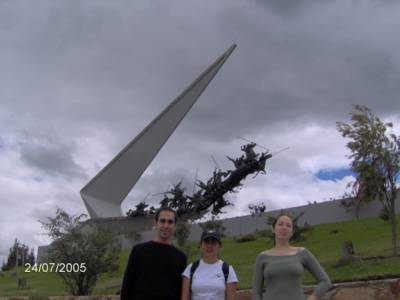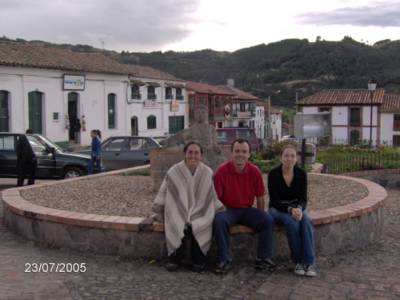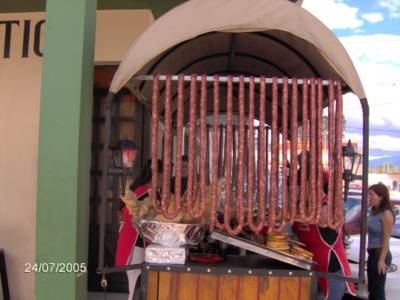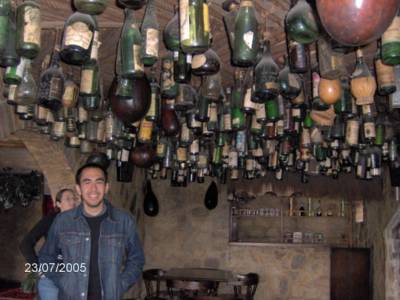Tremendous Trifles
Monday, March 13, 2006
Wednesday, December 14, 2005
Celebrate Christmas like a Catholic!
It always irked me to see people taking down all the Christmas decorations and storing away all the CDs with carols as soon as Christmas Day was past. Now, I've discovered that the Church is actually on my side in this matter (of course She is!). In his latest column, George Weigel reminds us of a lot we have forgotten about celebrating Christmas. I am taking his advice to heart and celebrating Christmas like a Catholic this year! The following key points from his article provide some very interesting insights about Advent and Christmastime:Twenty-one years in Washington, D.C., should have rendered me impervious to the bizarre. But I confess to having been taken aback in mid-October when, inside a grocery where I was vainly searching for some decent Peccorino Romano, I saw an enormous Christmas display with ersatz snow and all the trimmings. It was bad enough when stores started putting out the Christmas decorations (or, as they now say, "holiday decorations") a nanosecond after sweeping their shelves of leftover candy corn and other Halloween goodies beloved of dentists with medical school bills to pay. But Santa and the elves two weeks before Halloween?
It works the same way at the other end, so to speak. The estimable Father John Jay Hughes reports that the St. Louis Post-Dispatch ran a feature article last December 26 on how to disassemble and store Christmas decorations. As Father Hughes commented, "In my childhood, thanks to my Anglican priest-father, we were never permitted to put up the tree or any Christmas decorations until Christmas Eve. And once up, they stayed there until at least the Octave of Epiphany."
Fifteen years of intense involvement with Poles and Poland has given me an even more capacious view of the Christmas season. In Poland, the decorations stay up, the Christmas carols are sung, and the celebration of the Incarnation continues until February 2, the Feast of the Presentation, or Candlemas [note: Now that's what I'm taking 'bout!]. That's the way it was in the papal apartment in Rome between 1978 and 2004. And that's the way it will be in Poland's intact Catholic culture this year.
(...)
We need more Advent and Christmas, not less – but we need them at the proper time, which is the Church's time, not Macy's time or Wal-Mart's time. Taking Advent seriously would be a good beginning. The widespread use of Advent wreathes in churches is a welcome development. Even more welcome would be pastors actively encouraging every Catholic family to have an Advent wreath in their home, to learn the rituals of lighting it, and to pray together at the nightly lighting of the wreath during one of the most spiritually rich seasons of the Church's year of grace.
Reconstituting the liturgical calendar would also help. The Solemnity of the Epiphany belongs on January 6, period. Restoring Epiphany to its proper place would do justice to a generally neglected feast; in a nifty countercultural move, it would also stretch the Christmas season back to its proper length. And while we're on the Epiphany, why not stretch it out, too? Bringing back, say, three "Sundays After Epiphany" would give the Church a greater opportunity to pray over the mission-to-the-nations, one of the great themes embedded in the Lord’s "epiphany." What's the rush to get to "Ordinary Time"? Wouldn't it be spiritually beneficial to spend more time in that extraordinary time marked by Advent, Christmas, and Epiphany?
Let's be different. Let's let liturgical time define this unique time of the year.
Sunday, November 27, 2005
GLORIA IN PROFUNDIS
by Gilbert Keith ChestertonThere has fallen on earth for a token
A god too great for the sky.
He has burst out of all things and broken
The bounds of eternity:
Into time and the terminal land
He has strayed like a thief or a lover,
For the wine of the world brims over,
Its splendour is split on the sand.
Who is proud when the heavens are humble,
Who mounts if the mountains fall,
If the fixed stars topple and tumble
And a deluge of love drowns all-
Who rears up his head for a crown,
Who holds up his will for a warrant,
Who strives with the starry torrent,
When all that is good goes down?
For in dread of such falling and failing
The fallen angels fell
Inverted in insolence, scaling
The hanging mountain of hell:
But unmeasured of plummet and rod
Too deep for their sight to scan,
Outrushing the fall of man
Is the height of the fall of God.
Glory to God in the Lowest
The spout of the stars in spate-
Where thunderbolt thinks to be slowest
And the lightning fears to be late:
As men dive for sunken gem
Pursuing, we hunt and hound it,
The fallen star has found it
In the cavern of Bethlehem.
Thursday, November 17, 2005
Blog Temporarily Out of Service!
As you may have noticed, I have not been posting much during the last couple of months. The reason is that my internet at home has been down and that I am currently engaged in a pretty interesting project that you may check out by clicking here. I have not forgotten about the existence of Tremendous Trifles, but I will not be able to begin posting regularly for at least another month.Saturday, September 24, 2005
Evil Strikes the Notre Dame Campus!!!
You need to see this. So good. Click here now!It can take a while to load, but its worth the wait.
Thursday, September 01, 2005
Just Plain Trifles
This is yet another post in that never-ending series of posts about how I'm so upset that my blog sucks so much. But it does, so what else can I do but complain about it? Surely not write something good to post; that would too smart. In any case, I was looking through all my history of posts and I have discovered that the blog's suckiness has progressed in an unceasing manner throughout the past year. Evidence of this is that my own sister, who was once my number one fan, does not read it anymore. If you look back, old posts are full of her comments, but I guess recently there hasn't been anything good to comment about. Besides that, a mysterious "Anonymous" fan who used to comment a lot, and who apparently loved my posts for some inexplicable reason, has almost completely disappeared. I've always been intrigued to know who this person might be, but since the blog's boringness drove them away, perhaps now I'll never now. Finally, now and then I catch a whiff of arrogance in some of my posts that, although it indeed reflects arrogance that exists within me, I detest. Thus, the blog more and more feels simply like a collection of plain old trifles, rather than tremendous ones.I justify my unwillingness to post by pointing to the many urgent and important things I must attend to, but to be quite frank, the problem is really laziness. When I'm musing about some subject on my own time, sometimes I stumble into ideas that truly excite or inspire me, but when I think that to communicate them to others I might have to struggle through a few paragraphs, I prefer to leave the matter for a later time. Of course, that time never comes, and the idea drifts away from my mind as quick as it came, perhaps never to be heard of again.
To be perfectly honest, though, I must also admit that many times I'm afraid to post my thoughts online for everyone to see. I fight against it, but it nevertheless frightens me to think that someone might rip my exposed thoughts apart in a fury of criticism, or alternatively, that someone I personally know might disapprove of me because of what they read. All my life I have been an avowed opponent of thinking, saying, or doing anything based on what others might think, but I must admit that to do so consistently sometimes takes more than one would think.
I utterly despise labels. They are a simplistic, mindless substitute for thought that, when applied to people, squashes their experience, essence, and the meaning of what they stand for into a dull, predetermined category on an ideological file cabinet. Of course, publicly expressing thoughts or opinions makes one vulnerable to being labeled, and I could almost say that the thought terrifies me. In a way, this fear might be a little irrational, but in another it is quite justified. It is the fear of losing my personhood in the eyes of another.
That is why the idea of Heaven excites me, as it does every human being (consciously or unconsciously), for to be in Heaven must surely be to be a true person. If each human being (indeed each thing in Creation) is so unique, it must be for a reason. Each new work of art says something new of the artist, and God does not make reproductions. Thus, I must have been made to express the beauty, the wonder, the Glory of one special part of Him who Created me. That is my mission. If I fulfill it, then I know will truly be a person like never before. I will finally and truly be accepted for who I am, since I will be accepted (into God's love in eternity) precisely because of who I am. What greater desire could there be? What greater adventure than to be myself? There is one lock in Heaven for which only my soul is the key.
And on that note, I guess I've rambled enough for one night. Sleep tight.
Monday, August 29, 2005
Tired of Hearing About Iraq?
I know I am. Especially because all you ever get from the media is the usual drivel about how we need to get out out fast, or how we should simply "stay the course," or how Bush is a liar and just wanted revenge against Saddam, or how we should go ahead and invade Iran, North Korea, and Venezuela. In any case, ever since it was announced that "Bush is an idiot" (a comment that apparently never gets old), all sorts of people that are almost completely ignorant of foreign affairs suddenly feel entitled to consider themselves experts on the matter and share their nonsense with anyone within earshot. If you are as tired of this as I am, I suggest you stop paying attention to these insta-experts when forming your own opinions. Try gathering some insights from those who at least have somewhat of a clue about what is going on. The pages of Foreign Affairs magazine are a good place to start, as well as Foreign Policy magazine and the Foreign Policy Research Institute website (this one is highly recommended). Below is an excerpt from an article in Foreign Affairs that touches on some aspects that I constantly hear a lot of nonesense about:
Both insurgent camps know they cannot defeat the U.S.-led coalition militarily. Their best chance of success is to wait for a premature U.S. withdrawal and then spark a coup, in which a small, well-disciplined group with foreign backing seizes power from a weak, demoralized regime. Toward this end, the insurgents are fighting to perpetuate disorder and to prevent the establishment of a legitimate, democratic Iraqi government. By creating an atmosphere of intimidation, insecurity, and despair, they hope to undermine support for the government. Brazen attacks on its leaders and police send a chilling message to the Iraqi people: If the government cannot even protect its own, how can it protect you? Sabotage of Iraq's national infrastructure underscores the government's failure to provide basic services such as water and electricity and to sustain the oil production on which Iraq's welfare depends. By inflicting casualties on U.S. forces at the same time, the insurgents seek to raise the cost of continued U.S. involvement and weaken support for the war back home -- thereby hastening a U.S. withdrawal.
The insurgents have proved themselves to be resilient and resourceful, but they have also shown serious weaknesses. Compared with the United States' opponents in Vietnam, they are a relatively small and isolated group; the Iraqi rebels number no more than a few tens of thousands, whereas the ranks of the Vietnamese Communists were composed of roughly ten times that number. Iraqi insurgents rarely fight in groups as large as 100; in Vietnam, U.S. forces often encountered well-coordinated enemy formations of far greater size. The Vietnamese Communists, veterans of over two decades of nearly continuous war against the Japanese, the French, and the South Vietnamese, were also far better trained and led than the Iraqi insurgents and enjoyed external backing from China and the Soviet Union. The support provided to the insurgents by Iran, Syria, and radical Islamists elsewhere pales in comparison.
The Iraqi insurgents are also relatively isolated from the Iraqi people. Sunni Arab Muslims comprise the overwhelming majority of insurgent forces but account for only 20 percent of Iraq's population, and the jihadists are mostly foreigners. Neither insurgent movement has any chance of stimulating a broad-based uprising that involves Arab Shiites and Kurds. Indeed, despite the hardships endured by the Iraqi people, there has been nothing even approaching a mass revolt against the U.S.-led forces or the interim Iraqi government. This is not surprising, for the insurgents have no positive message with which to inspire popular support. A Baathist restoration would mean a return to the misery of Saddam's rule, and the jihadists would do to Iraq what radical Islamists have done in Afghanistan and Iran: introduce a reign of terror and repression.
The insurgency's success, accordingly, depends on continued disorder to forestall the creation of a stable, democratic Iraq and erode the coalition's willingness to persist and prevail. The insurgents believe the coalition lacks staying power, citing as evidence the U.S. withdrawals from Lebanon following the 1983 bombing of the Marine barracks in Beirut and from Somalia a decade later after 18 U.S. servicemen were killed. The Baathist insurgents hope that if they succeed in outlasting the Americans, support from Syria and other Arab states will enable them to topple the new regime. This would likely trigger a civil war, with Shiite Arab Iraqis supported by Iran. Radical Islamists would have perhaps their best chance of seizing power under such chaotic conditions.
Thursday, August 18, 2005

BRAVO, a teen magazine in Germany, normally includes a poster featuring the newest pop band with its issues. This month, however, they have been distributing posters with the Holy Father's image in preparation for World Youth Day. Apparently the posters have been a tremendous success. Demand is so large that some people have even put up their own copy for sale on e-bay. It seems that there might still be hope for Germany, after all.
Thursday, August 11, 2005
Factcheck.org: NARAL Falsely Accuses Supreme Court Nominee Roberts
Not finding anything real with which to accuse Supreme court Nominee John Roberts, NARAL has decided to fall back on their only option: lies. Here is what Penn's Factcheck.org has to say about a new NARAL ad attacking Roberts:NARAL Falsely Accuses Supreme Court Nominee Roberts
An abortion-rights group is running an attack ad accusing Supreme Court nominee John Roberts of filing legal papers "supporting . . . a convicted clinic bomber" and of having an ideology that "leads him to excuse violence against other Americans." It shows images of a bombed clinic in Birmingham, Alabama .
The ad is false.
In addition, Factcheck.org also states that:
The images used in the ad are especially misleading. The pictures are of a clinic bombing that happened nearly seven years after Roberts signed the legal brief in question.
Finally, they point out that:
In fact, Roberts called clinic bombers "criminals" who should be prosecuted fully.
It's funny. The add concludes with the words "America can't afford a Justice whose ideology leads him to excuse violence against other Americans." I would suggest that what America can't afford are extremists like NARAL "whose ideology leads them to excuse the violence of blatant lies against other Americans."
Wednesday, August 03, 2005

The monument by Rodrigo Arenas depicting fourteen heroic spearmen on horses at the Pantano de Vargas (Vargas's Swamp), the site of a decisive battle in the Colombian independence movement.

The gorgeous Basilica of Mongui. This is an amazing church located in a very tiny village lost in the middle of the mountains. It is amazing how the Church was able to bring such beautiful works of art and architecture to such remote places. The village as a whole is beautiful as well, though probably no bigger than it was a century ago.





